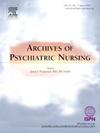Prevalence of depression, anxiety and the coping strategies of patients recovered from COVID-19 infection in a Malaysian tertiary hospital
IF 2.2
4区 医学
Q1 NURSING
引用次数: 0
Abstract
Objectives
This study evaluates the prevalence of depression and anxiety among patients who recovered from COVID-19 infection, with a focus on the significance of coping strategies, particularly in the culturally diverse country like Malaysia. Understanding these mechanisms is vital for addressing mental health challenges post-pandemic.
Methods
A cross-sectional study was conducted among patients treated for COVID-19 in a tertiary hospital in Malaysia. The Depression Anxiety Stress Scale (DASS-21) and Brief-COPE were used to measure mental health and coping strategies. Cultural influences, such as the role of religion and community, were considered alongside coping mechanisms. Non-probability sampling was employed, limiting generalizability. Multivariate logistic regression controlled for confounding variables such as age, gender, and comorbidities.
Results
The prevalence of depression and anxiety among participants was 27.9 % and 43.6 %, respectively. Hospitalized respondents showed higher level of anxiety with OR = 5.03 (CI: 1.09–23.23). Avoidant coping increased the odds of depression and anxiety, while approach coping decreased these odds. Although religion is an important cultural factor in Malaysia, it did not emerge as a statistically significant coping mechanism in this study, highlighting the complexity of cultural influences on mental health.
Conclusion
Depression and anxiety remain prevalent among COVID-19 survivors, especially among those hospitalized. Targeted mental health interventions that promote approach coping strategies and address cultural influences are essential. Policymakers should focus on providing long-term mental health support, particularly for vulnerable groups, and consider the potential of AI tools to enhance post-pandemic care.
马来西亚一家三级医院COVID-19感染康复患者抑郁、焦虑的患病率及应对策略
本研究评估了COVID-19感染后康复的患者抑郁和焦虑的患病率,重点关注应对策略的重要性,特别是在马来西亚这样的文化多元化国家。了解这些机制对于应对大流行后的精神卫生挑战至关重要。方法对马来西亚某三级医院收治的COVID-19患者进行横断面研究。采用抑郁焦虑压力量表(DASS-21)和Brief-COPE测量心理健康状况和应对策略。文化影响,如宗教和社区的作用,与应对机制一起被考虑。采用非概率抽样,限制了概括性。多变量逻辑回归控制了诸如年龄、性别和合并症等混杂变量。结果调查对象的抑郁和焦虑患病率分别为27.9%和43.6%。住院被调查者的焦虑水平较高,OR = 5.03 (CI: 1.09-23.23)。逃避型应对增加了抑郁和焦虑的几率,而接近型应对则降低了这些几率。虽然宗教在马来西亚是一个重要的文化因素,但在本研究中,宗教并没有成为统计上显著的应对机制,这凸显了文化对心理健康影响的复杂性。结论在COVID-19幸存者中,尤其是住院患者中,抑郁和焦虑仍然普遍存在。促进应对策略和解决文化影响的有针对性的心理健康干预措施至关重要。政策制定者应侧重于提供长期精神卫生支持,特别是为弱势群体提供支持,并考虑人工智能工具在加强大流行后护理方面的潜力。
本文章由计算机程序翻译,如有差异,请以英文原文为准。
求助全文
约1分钟内获得全文
求助全文
来源期刊
CiteScore
3.70
自引率
0.00%
发文量
131
审稿时长
160 days
期刊介绍:
Archives of Psychiatric Nursing disseminates original, peer-reviewed research that is of interest to psychiatric and mental health care nurses. The field is considered in its broadest perspective, including theory, practice and research applications related to all ages, special populations, settings, and interdisciplinary collaborations in both the public and private sectors. Through critical study, expositions, and review of practice, Archives of Psychiatric Nursing is a medium for clinical scholarship to provide theoretical linkages among diverse areas of practice.

 求助内容:
求助内容: 应助结果提醒方式:
应助结果提醒方式:


